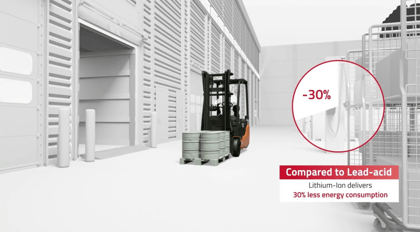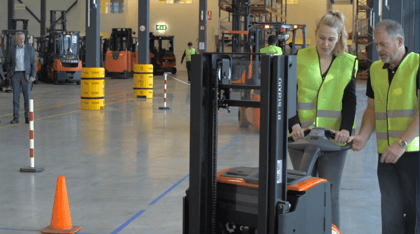Energy is a hot topic at the moment, in clear focus due to significantly higher cost levels and also the impact on the environment due to CO2 emissions. This is particularly true for companies involved in material handling and logistics. So, what can be done to save energy? These questions are answered in the latest programme in the Logiconomi TV series. Craig Walby, Toyota Material Handling Europe’s Director for Product Management discusses the impact of switching to new battery technology and Olivier Drouin, expert in safety and training, talks about educating drivers to move from fast to smooth operation. The savings that can be achieved are surprising.
Watch a short teaser of the latest Logiconomi TV series.
Switching to lithium-ion
Lithium-ion batteries have been available for some years now, and they offer considerable benefits when it comes to energy consumption. They are typically around 30% more energy efficient than traditional lead-acid batteries, which means low energy cost as well as lower CO2 emissions. At current rates this translates to at least €1 per hour lower operating costs.
Why isn’t everyone using lithium-ion batteries?
It raises the question of why everybody hasn’t everyone switched to lithium-ion already? The main reason is cost. Up until now lithium-ion batteries are more expensive than equivalent lead acid units and this has been a barrier for many users. But look more closely and the story is different. Firstly, the size of a lithium-ion battery can be smaller than a lead-acid unit because of the way they work. Regular charging during work breaks can enable a small lithium-ion battery to easily work a full shift. So, by adopting revised charging disciplines the purchase cost comes much more in line with lead-acid. The second and very important point to consider is that the operating life of a lithium ion battery is substantially longer – up to 3 times longer, in fact.
So, taking everything into account, the case for switching to lithium-ion is extremely compelling. By optimising the size of the battery through regular charging routines you can lower the initial investment cost, you get a longer operating life, and €1 per hour energy savings as well as a 30% reduction in CO2 emissions during use-phase.
What impact can the driver have?
Another key area of opportunity when it comes to saving energy is the role of the driver. Historically in busy distribution centres there has been an emphasis on speed of operation, with fast acceleration and heavy braking playing a major part. However, studies have shown that taking a different approach can have a dramatic impact on energy consumption.
Big savings with eco-driving
Controlled tests have measured that energy consumption can be reduced by around 6% through eco-driving, and CO2 emissions can be brought down by 10%. Furthermore, drivers are very receptive to adopting this approach, given the general awareness in society for the need to combat climate change.
What impact on productivity?
The first reaction from many people is an assumption that productivity will be adversely affected through speed reduction. However, this is not the case. The key is to adjust scheduling to allow more flexibility. Additionally, there is the potential for substantial reductions in accidents and damage costs which are often associated with high-pressure operations. The change of emphasis from ‘fast’ to ‘smooth’ gives significant benefits.
Get the complete story by watching the latest Logiconomi-TV episode “Save your energy”.







